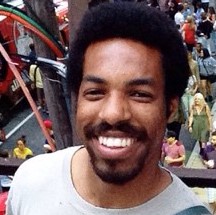5 Questions With...(new) Deacon Stephen Tsai
Peter Brown
(new) Deacon Stephen Tsai
1. How did you first get involved with Friendship Presbyterian? My wife and another Christian from her workplace set out to find a place we could call our home church while we lived in Taiwan. The first church in Taipei we attended was well known and recommended, but after attending several services we decided it wasn’t the right one. The teachings they preached sounded good on the surface, often referencing God’s love and grace, but under the nuance and subtlety was a deeply legalistic message. Although it seemed harmless, even good, my wife and I were both enslaved by messages like that in the past.
For twenty-six years, I had gone to Taiwanese-American churches steeped in legalism and mysticism. Their teachings deeply damaged me for most of my life. My wife has a similar past. Then, in 2006, God led us to a pastor and church that was theologically sound where the good news finally reached us.
Finding a church in Taiwan that was centered on the gospel was a priority for us. FPC was the second church we attended. My wife knew right away it was the place we were meant to go. It took me another two or three services to come to the same conclusion. (What can I say? I come to conclusions slowly).
2. What do you do Monday through Saturday? I do not have a paying job, so, in one sense, I do whatever I want! However, I have tasks that I am deeply committed to. One is studying. Pastor Dennis had recommended that I look into seminary courses by Third Millennium, a ministry intended for training leaders who may lack proper theological resources in their home countries. I heartily endorse the curriculum for anyone interested. It is free and available in several languages. At first, I did this just out of curiosity, but it has become a real joy in my life lately. I am also currently leading FPC’s #tbt community group. I am not a leader or teacher by nature, so it takes me a long time to prepare for each study--about three hours a week. I attend the T.G.I.F. group as a participant. And I practice Jiu-Jitsu. I have trained in martial arts for almost thirty years. My physical abilities have decreased with age and injuries so, these last few years, I have quit the striking arts (hitting, punching, kicking, etc.) and focused on grappling (wrestling, grabbing, submissions). It allows me to enjoy the physical challenge and competitive sparring with fewer injuries. I started Brazilian Jiu-Jitsu in 2010 and used to train daily and compete. But it has been on the back burner these days, as I shift my priorities to studying.
3. What is something people might be surprised to know about you? I am, or was, really into motorsport. It started with cars, just typical American teenager stuff like drag racing and modifying cars. Over the years my hobby evolved. It went from street to racetrack, and from cars to motorcycles. I eventually got my certification to race motorcycles and have completed several classes/courses on advanced riding. Nowadays, due to lack of funds and time I do not get to the track regularly. But I still get professional instruction and train at a race school every couple of years as a refresher and for fun.
4. What do you find most challenging about being a Christian today? The promises of this world. Our career promises financial security and purpose. Money promises security and leisure. Education promises self-fulfillment and social admiration. Significant others promise true love. The list goes on. We are constantly bombarded by these promises, spewed out by all forms of media and deeply embedded into the personalities of those we call our friends and family. It seems impossible to escape.
The real struggle for me is to preach to myself every moment I can remember to and turn to God. I often fail, both consciously and unconsciously. But I have faith in God’s promises and know God will enable me to reject the enslavement this world offers.
5. What is your favorite book of the Bible, and why? It used to be Romans because it is so densely packed with theological wisdom. But lately, Galatians has really spoken to me. I really relate when Paul writes that adding anything to the gospel reverses (“distorts” in ESV) it. That message hits me hard because it’s something I unintentionally do all the time.
Gospel + (good works; serving; being a moral person; going to church; etc.) = salvation. That is the direction my mind keeps going back to, even if I know better, intellectually. So when Paul is writing, it feels like he is writing directly to me.
Paul reminds us that God called us, we did not call Him, and that any change to the gospel makes it about what we do for God, rather than what He has done for us.



